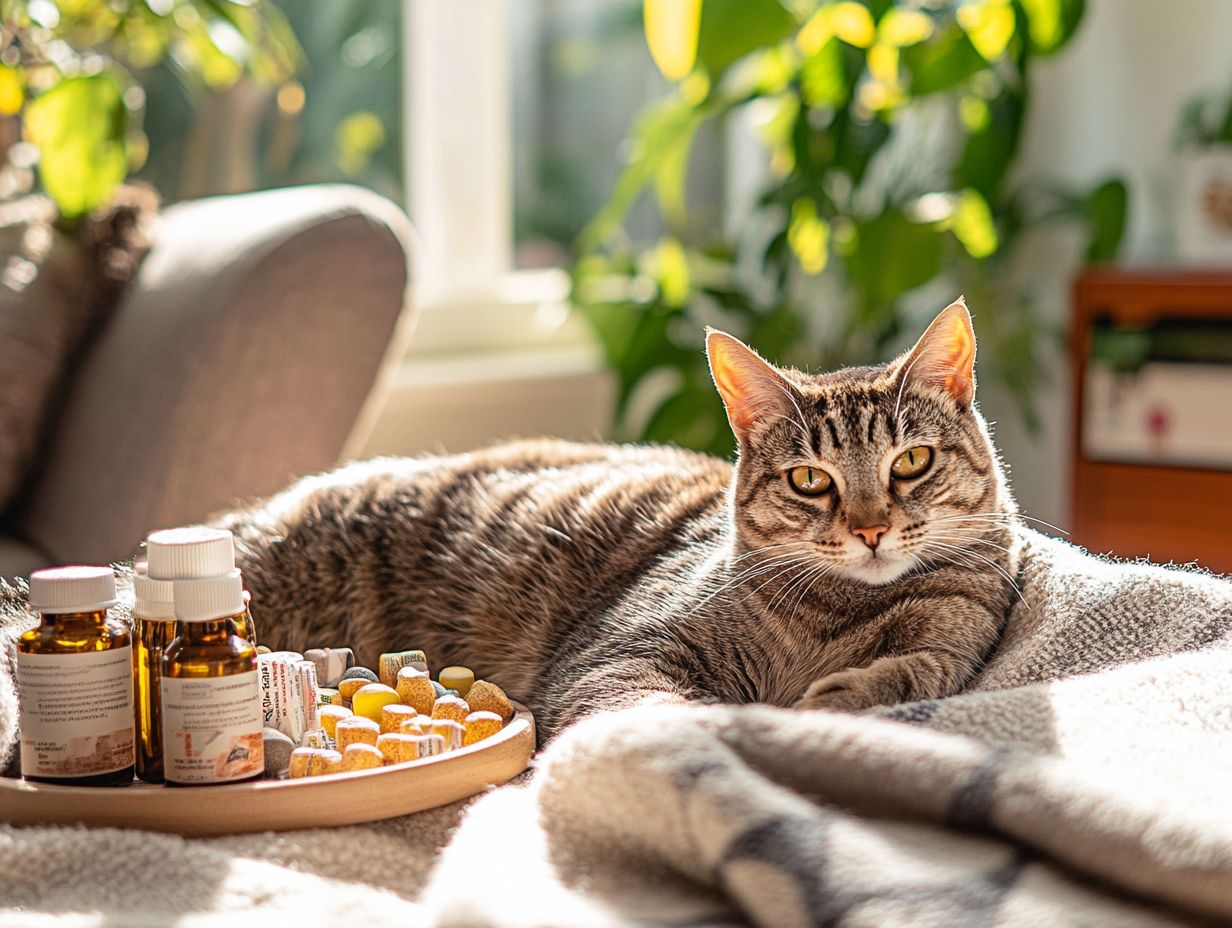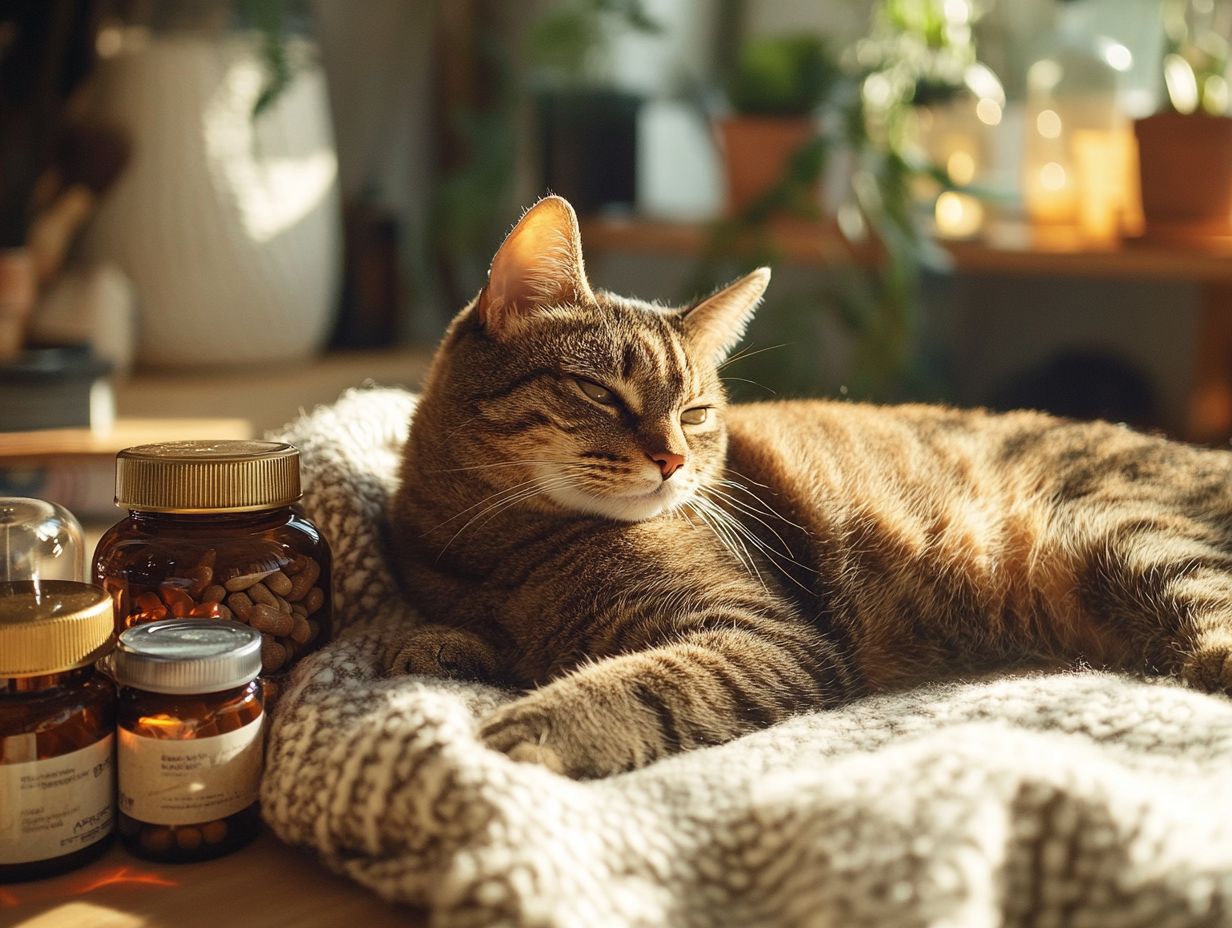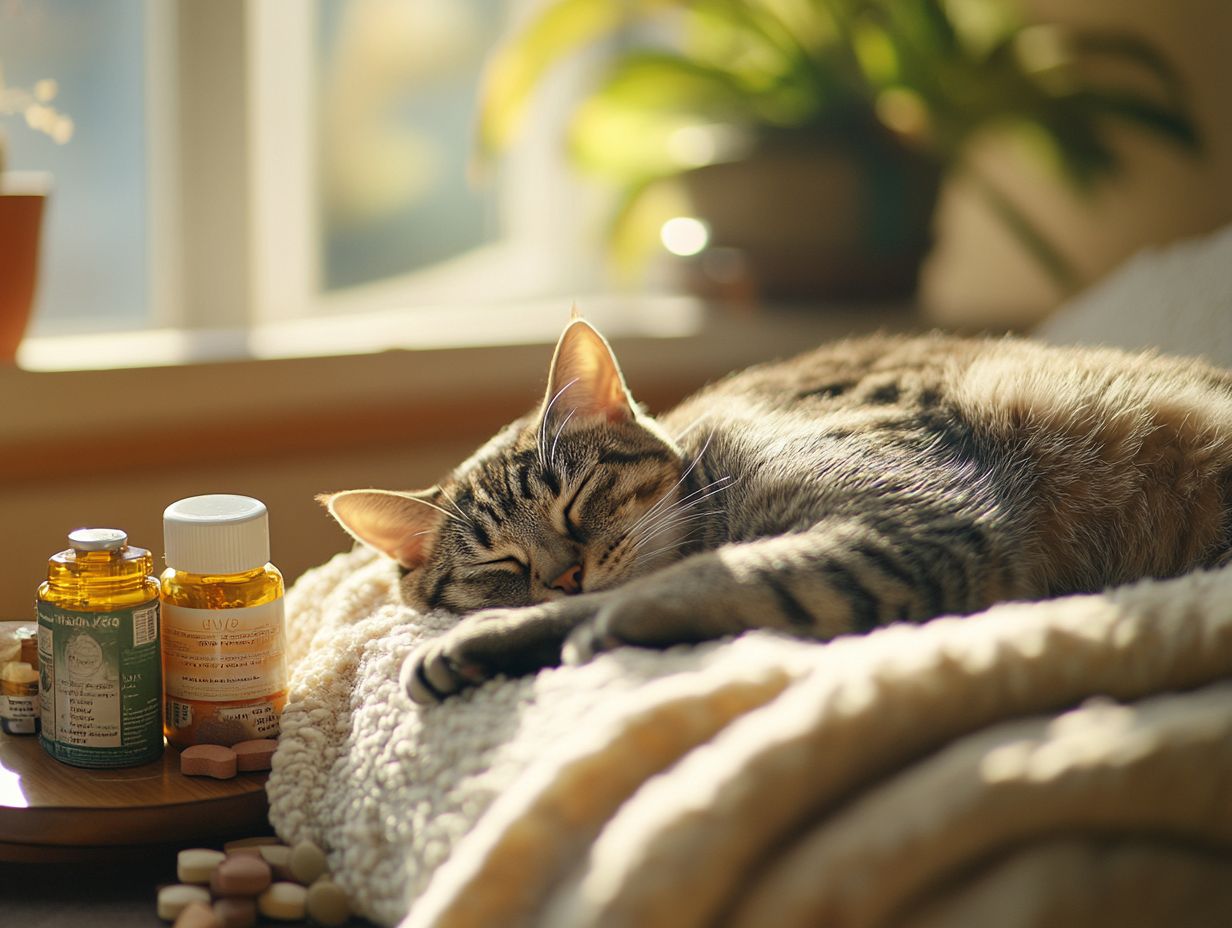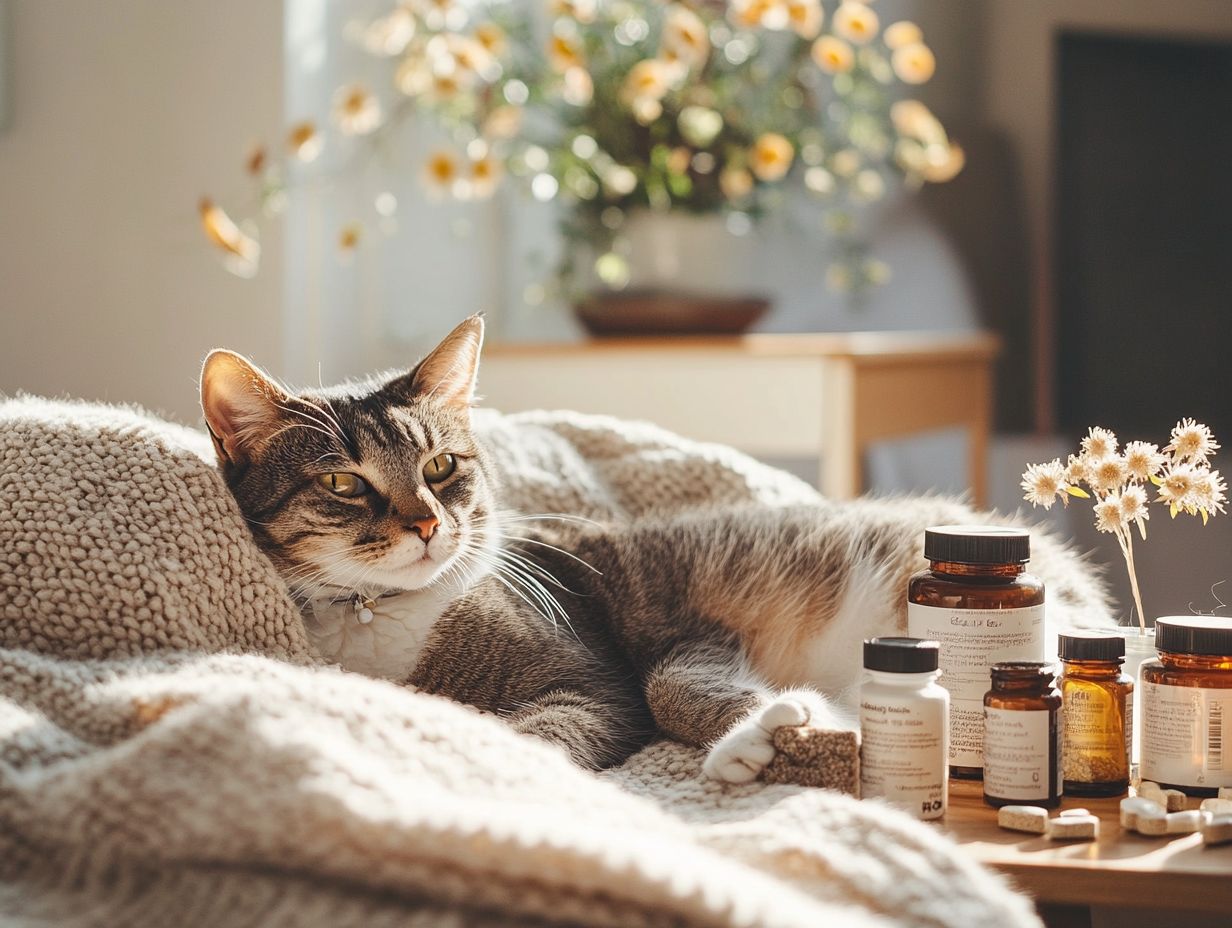Cats are obligate carnivores, meaning their diet must primarily consist of animal-source proteins to meet their nutritional needs. Allergies in cats can be puzzling for pet owners, affecting their furry friends’ comfort and well-being.
Understanding the triggers and types of allergies, such as seasonal allergies, is crucial for effective management. Additionally, it is vital to recognize potential nutritional deficiencies that can arise from various diet types, including raw, vegan, or homemade diets. Always consult a veterinarian for tailored dietary advice.
This article explores what causes these sensitivities, highlights the most common allergens that cats face, and emphasizes the importance of a balanced diet that meets the specific nutritional needs of cats at different life stages.
Beyond diet, it discusses key supplements like omega fatty acids and probiotics, along with lifestyle changes that can enhance your cat’s health. Specific information on necessary dosages and potential interactions with medications is included, reflecting the latest veterinary recommendations.
It also covers potential side effects and important considerations for supplement usage. Please note that while supplements can support health, they should not replace a balanced diet.
Discover ways to keep your feline companion happy and healthy!
Key Takeaways:

- Include Omega-3 fatty acids, such as fish oil, in your cat’s diet to reduce inflammation and alleviate allergy symptoms. Always consult with your veterinarian for appropriate dosages.
- Probiotics can help improve your cat’s gut health, boosting their immune system to fight off allergies, but should be used under veterinary guidance.
- Consult with veterinarians before giving supplements to your allergic cat to avoid potential side effects and interactions with other medications.
- Do not self-prescribe supplements without veterinary consultation to ensure safety and monitoring for side effects.
Understanding Allergies in Cats
Understanding allergies in cats is crucial for pet owners, as these allergies can significantly affect their health and well-being. Cats can experience allergies triggered by various factors, including environmental elements like pollen and dust, as well as dietary influences.
Seasonal allergies are particularly common, especially during times when certain allergens are more prevalent. Symptoms of allergies in cats may include itching, skin irritations, and digestive issues, all of which can diminish their quality of life.
Therefore, seeking appropriate relief and management for cat allergies through veterinarians is essential to prevent complications. Practical tips for identifying and managing allergens include keeping a clean environment and monitoring your cat for any unusual symptoms.
What Causes Allergies in Cats?
Cat allergies can arise from various allergens that trigger the immune system, leading to discomfort and health issues. These allergens can be categorized into environmental triggers, such as pollen and dust mites, and food-related irritants.
Many cats may be allergic to specific proteins found in meat or dairy, which can provoke a strong immune response. The body’s reaction may manifest in several ways, including skin irritation, hives, gastrointestinal disturbances, and respiratory problems.
Understanding these triggers is essential for providing effective immune system support, as it helps reduce symptoms and improve the overall quality of life for cats. It is recommended to consult veterinarians for testing and diagnosis when allergies are suspected.
What Are the Most Common Allergies in Cats?
The most common allergies in cats include seasonal allergies, food allergies, and flea allergy dermatitis, each presenting unique symptoms and challenges.
Seasonal allergies often arise from exposure to pollen, mold, or dust mites, leading to symptoms such as sneezing, itching, and watery eyes as the cat seeks relief. In contrast, food allergies may manifest through gastrointestinal issues like vomiting or diarrhea, accompanied by skin irritations.
Flea allergy dermatitis is particularly concerning, as it typically results from an adverse reaction to flea saliva, causing severe itching and hair loss, especially around the tail and neck areas.
Understanding these allergies is vital for pet owners, as it enables them to recognize the signs early and seek appropriate treatment for their feline companions.
How to Support Your Cat’s Health Beyond Diet
Ensuring your cat’s health involves more than just providing a balanced diet; it also includes using supplements like cat vitamins to promote their overall well-being. Always prioritize high-quality sources for these supplements and consult your veterinarian for guidance.
Omega-3 fatty acids are essential for maintaining healthy skin and joints, while probiotics play a crucial role in supporting proper digestion and immune function. Addressing special dietary needs for cats with conditions such as kidney disease or diabetes is also important.
Vet-recommended formulas and high-quality cat vitamins, featuring premium ingredients, can significantly enhance the quality of life for cats, particularly those dealing with allergies or skin issues.
Moreover, proper food storage and handling practices should be observed to ensure food safety for cats. Learn to identify spoilage and maintain ethical considerations regarding the sourcing of pet food ingredients while prioritizing feline health and nutrition.
1. Omega-3 Fatty Acids
Omega-3 fatty acids play a crucial role in ensuring proper joint function and maintaining skin moisture content in cats. These fatty acids possess anti-inflammatory properties that can help reduce inflammation in cats suffering from arthritis or other joint diseases.
Supplementing the diets of cats with arthritis with omega-3s, such as fish oil, can alleviate pain and enhance mobility, thereby improving their overall quality of life. Additionally, omega-3s contribute to a shiny coat and promote skin health in cats. It is essential to consult a veterinarian before introducing any supplements, especially for cats with existing health conditions.
Maintaining adequate levels of omega-3s, along with antioxidants like tart cherry, also supports healthy cardiovascular function in these animals, aligning with current AAFCO and WSAVA guidelines.
2. Probiotics

Probiotics play a vital role in promoting gut health and enhancing the immune function of cats. These beneficial bacteria support the digestive system by aiding in the breakdown of food and the absorption of nutrients, ultimately contributing to improved overall health.
Full-spectrum probiotics contain a diverse range of strains that help maintain a balanced gut microbiome, which is essential for preventing infections and diseases while naturally supporting the feline immune response. However, cats with certain health conditions or those on specific medications should use probiotics with caution and under veterinary guidance. Incorporating probiotics into a cat’s diet can establish a foundation for long-term health and well-being.
3. Quercetin
Quercetin is a natural antioxidant that effectively relieves allergies in cats suffering from seasonal allergies. This powerful flavonoid functions as a natural antihistamine by stabilizing mast cells, which helps reduce the release of histamines that trigger allergic reactions. It should be used with caution and under veterinary supervision, particularly in cats with specific health concerns.
Along with alleviating allergy symptoms, quercetin plays a crucial role in supporting the immune system by combating oxidative stress and inflammation. Its ability to inhibit the release of pro-inflammatory cytokines aids in maintaining overall health, making it a valuable resource for both allergy management and enhancing general wellness in felines.
With regular intake, this compound may contribute to a more balanced immune response, providing significant benefits during allergy seasons.
4. Vitamin C
Vitamin C is an important antioxidant that supports the immune system in cats, particularly during allergy season. While cats can synthesize it, supplementation may still be beneficial under certain circumstances, particularly for those with increased sensitivity or experiencing allergic reactions. It’s advisable to consult a veterinarian before beginning any supplementation.
Its ability to neutralize harmful free radicals helps reduce inflammation and oxidative stress, which is especially beneficial for cats with increased sensitivity or those experiencing allergic reactions.
By strengthening the immune system, Vitamin C plays a crucial role in maintaining the health of these cats, enabling them to better fend off infections and other illnesses. Providing a source of this essential nutrient can also promote skin and coat health, which is vital for cats suffering from environmental allergens that may cause irritation.
Ensuring that these furry companions receive enough Vitamin C can significantly enhance their overall health and vitality, supporting healthy skin.
5. Colostrum
Colostrum is a nutrient-dense supplement that plays a crucial role in boosting immune function in cats. This highly nutritious and multifunctional fluid is produced during the first days of life after a queen cat gives birth, and it is rich in antibodies, vitamins, and minerals essential for the healthy development of a newborn’s immune system.
Its benefits extend beyond the immediate health of kittens; colostrum also supports the overall vitality and lifelong well-being of cats. Many pet owners may not realize that colostrum helps fight infections, reduces inflammation, and improves gut health, thereby contributing significantly to the long and active lives of cats. When selecting colostrum supplements, it is important to consider ethical sourcing and choose high-quality products.
Supplementing with colostrum enhances energy and resilience in cats and is an important component of a feline diet.
Other Ways to Support Your Cat’s Health
Along with dietary considerations, other strategies to support a cat’s health include regular grooming, maintaining a clean home, and minimizing exposure to allergens. These approaches help reduce allergen exposure and enhance overall wellness. Maintaining a balanced diet appropriate for the cat’s life stage is also crucial.
By regularly grooming a cat, loose fur and dander are removed, while a clean living environment prevents the accumulation of allergens. Additionally, it is important to identify spoilage in both commercial and homemade cat food to ensure safe feeding practices. Consulting with veterinarians can offer tailored strategies to promote a cat’s health and comfort.
1. Regular Grooming
Regular grooming is essential for maintaining skin health and reducing allergens in cats. Consistent brushing helps remove loose hair and dander, both of which are common allergens.
Additionally, brushing distributes the natural oils throughout the fur, resulting in a healthier and shinier coat. Clean and healthy skin is less prone to matting and irritation, and it remains free from dust and pollen that may be present in the environment.
This not only enhances the cat’s comfort but also contributes to a cleaner home environment, thereby reducing the overall allergen load for all occupants.
2. Keep Your Home Clean

Cleaning your home effectively reduces allergens, promoting better health for your cats. Regular vacuuming of carpets and furniture using a HEPA filter vacuum, along with frequent dusting of surfaces, can significantly lower the levels of common allergens such as dust mites, mold, and pet dander.
A clean environment not only benefits residents but also creates a healthier space for pets. Maintaining cleanliness enhances a cat’s quality of life by helping to reduce respiratory issues and skin irritations, forming an essential part of a kitty skin routine.
Additionally, using air purifiers and frequently washing bedding can further ensure that allergen levels in your home remain low.
3. Minimize Exposure to Allergens with High-Quality Ingredients
Minimizing exposure to allergens is essential for providing allergy relief to sensitive cats. Creating a safe environment for these cats involves several important steps.
- Regular cleaning of their surroundings can significantly reduce dust, pollen, and dander, which are potential allergens.
- Utilizing HEPA-filtered air purifiers and probiotic targets can help capture airborne allergens effectively.
- Additionally, opting for hypoallergenic cat beds and washing them regularly can further decrease irritants.
- Being mindful of the types of cat food is also beneficial; grain-free or limited-ingredient diets, including options like chicken, can assist in identifying and eliminating allergens.
Implementing these measures can enhance the comfort and overall well-being of sensitive cats.
4. Consult with a Veterinarian
Consulting with a veterinarian is a crucial step in managing the health of cats, especially for those with allergies. Vets possess the expertise to identify the underlying causes of allergic reactions, whether they stem from food, environmental factors, or parasites.
A comprehensive consultation provides pet owners with personalized recommendations for effective treatment and preventive measures. This approach not only helps manage allergy symptoms but also enhances overall health.
Regular follow-ups and check-ups enable timely adjustments to treatment plans, ensuring that cats remain comfortable and content. Ultimately, veterinary consultations contribute to healthier and happier lives for pets, significantly improving their quality of life.
Potential Side Effects of Supplements for Allergic Cats
Cat supplements can offer numerous benefits for allergic cats; however, it is essential to be aware of potential side effects, interactions with other medications, and the risk of overdose. Always consult with a veterinarian for specific dosage guidelines before introducing any supplement.
1. Allergic Reactions
Allergic reactions to supplements in cats often trigger an immune system response and can manifest in various ways, affecting healthy skin. These reactions may present as skin irritations, including rashes, itching, or excessive grooming.
Gastrointestinal distress can occur, leading to symptoms such as vomiting, diarrhea, or changes in appetite after introducing a new supplement. Additionally, respiratory issues may arise, including difficulty breathing, sneezing, or nasal discharge.
It is crucial for cat owners to recognize these symptoms, as early detection can facilitate timely veterinary intervention. Identifying a potential allergic reaction in cats is essential for ensuring their overall health and well-being.
2. Interactions with Other Medications
Interactions between supplements and other medications can pose risks for cats, making it essential to consult a veterinarian. Many pet owners may not realize that certain natural remedies, like Wellmune® or Sporevia™, although seemingly harmless, can have unintended effects when administered alongside prescribed medications.
When considering dietary changes, especially for cats with pre-existing health conditions, it is important to follow veterinary recommendations. This includes adhering to AAFCO or WSAVA guidelines regarding the nutritional needs of your cat.
Cat owners should also keep a diary of any changes in their cat’s health or behavior when introducing new foods or supplements. This record can assist in discussions with their veterinarian.
It is vital to understand the difference between human and feline dietary needs and to avoid anthropomorphism. Ensure that all claims about diet types (e.g., grain-free, hypoallergenic) are supported by current veterinary research. A balanced diet tailored to the life stage and health conditions of the cat is essential, such as the unique nutritional needs of kittens or senior cats.
Safe food storage practices are also crucial to prevent spoilage; ensure food is kept in a cool, dry place and check for signs of spoilage before feeding. Address the potential risks of feeding home-cooked or raw diets, stressing the necessity of consulting with a veterinary professional to ensure nutritional adequacy and safety.
For sensitive cats, consider high-quality ingredients such as chicken, turkey, or fish, which are well-tolerated and beneficial. Avoid vague terms and provide clear, vetted options to enhance your cat’s diet.
For example, herbal supplements may influence the effectiveness of medications, potentially leading to inadequate treatment or adverse reactions. Always consult your veterinarian before introducing new supplements. Monitoring is crucial, as each cat’s health status and unique biochemistry can significantly influence how these combinations interact.
Therefore, understanding the importance of professional guidance is vital for ensuring the safety and well-being of feline companions. Regular check-ups and open discussions about all substances, including those that may not require a prescription, can help mitigate these risks. Adherence to AAFCO and WSAVA guidelines is essential for safety.
3. Overdose

An overdose of supplements can pose severe health risks to cats, highlighting the importance of administering the correct dosage. When feline caregivers mistakenly believe that exceeding recommended dosages is acceptable and exceed the recommended amounts, they may inadvertently expose their pets to toxic effects, such as complications like bladder issues or organ damage.
Symptoms such as vomiting, diarrhea, or even organ damage can vary depending on the supplement type and dosage, significantly affecting a cat’s well-being. Therefore, it is crucial for pet owners to recognize these dangers and prioritize adherence to the labeled dosages, as outlined by AAFCO and WSAVA guidelines.
Consulting with a qualified veterinary professional can provide invaluable guidance tailored to a cat’s specific health needs, ensuring that any supplementation supports rather than jeopardizes their overall health. This is especially important for cats with special dietary needs, such as those with kidney disease or diabetes.
Frequently Asked Questions
What are supplements for allergic cats?
Supplements for allergic cats are additional nutritional products such as antioxidants tart cherry and high-quality ingredients that can be given to cats to support their health beyond their regular diet. These supplements are specifically formulated to provide extra nutrients and improve specific health concerns that may not be addressed by a cat’s regular diet.
Why are supplements necessary for allergic cats?
Allergic cats often have weakened immune systems and may not be able to fully absorb all the necessary nutrients from their regular diet. Supplements like Glucosamine, Chondroitin, and Turmeric can help fill in any nutritional gaps and boost the immune system, leading to better overall health and less allergy symptoms.
What are some common supplements for allergic cats?
Some common supplements for allergic cats include omega-3 fatty acids, probiotics, antioxidants, and vitamins such as vitamin C and vitamin E. These supplements can help improve skin and coat health, reduce inflammation, and boost the immune system, supporting healthy joints and digestive health.
How do I determine the right supplements for my allergic cat?
It is important to consult with your veterinarian before starting any supplements for your allergic cat. Your vet can help determine the specific health concerns and nutritional needs of your cat and recommend the most appropriate supplements based on their age, breed, and overall health. Your veterinarian may also recommend specific brands or formulations that align with recognized nutritional standards.
What are the risks of inappropriate supplementation?
Inappropriate supplementation can lead to adverse health effects, including toxicity, nutrient imbalances, and exacerbation of existing health conditions. It’s essential to follow veterinary guidance to ensure safe and effective supplementation.
Can supplements completely cure allergies in cats?
No, supplements alone cannot cure allergies in cats. However, they can help support the immune system and alleviate symptoms, providing relief for your cat. It is important to also address the underlying cause of the allergies and work with your vet to develop a comprehensive treatment plan.
How should I give supplements to my allergic cat?
Supplements for allergic cats come in various forms such as pills, powders, and liquids. Some supplements can be mixed into your cat’s food, while others may need to be given separately. Always check the ingredient list for potential allergens and follow the instructions on the supplement packaging or consult with your veterinarian for the best way to administer the supplements to your cat. Proper food storage is also important; check expiration dates and store supplements in a cool, dry place to maintain their potency and safety.